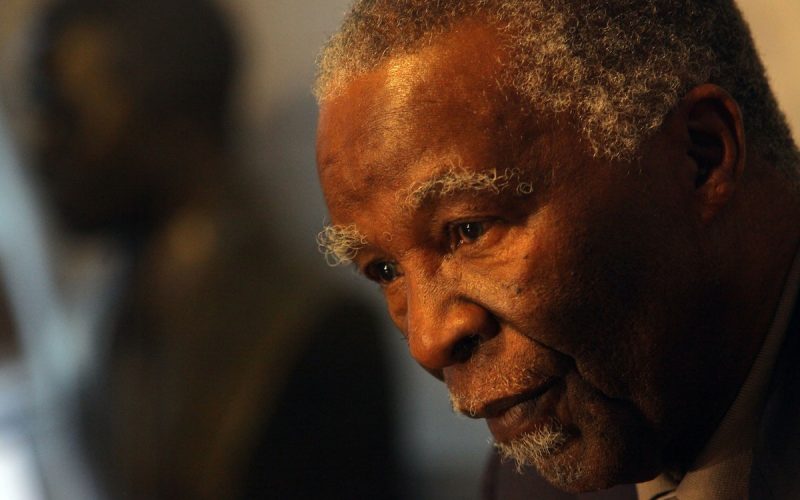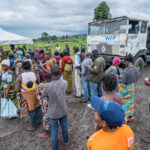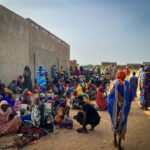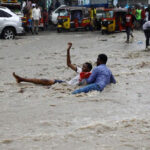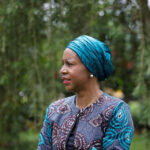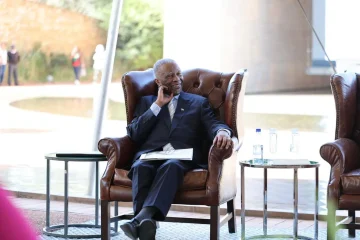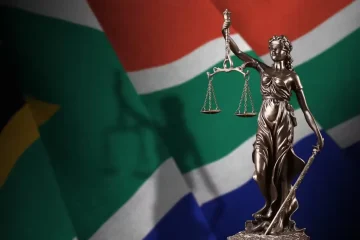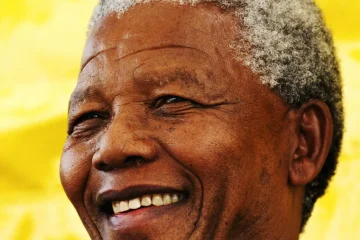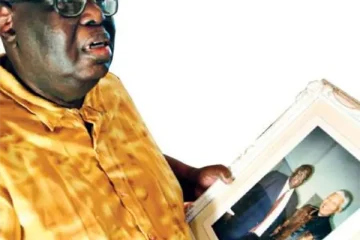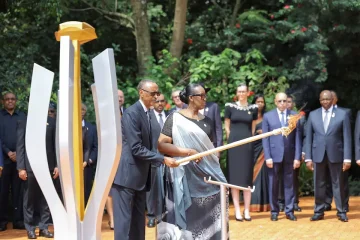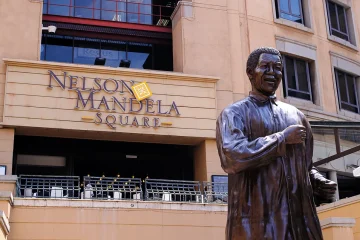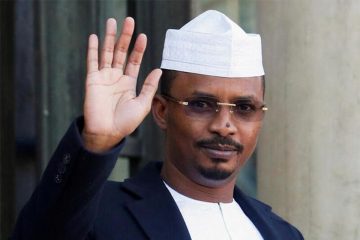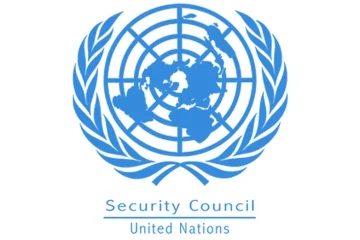SUDAN is no stranger to humanitarian crises. Indeed, its recent history has been punctuated by episodes of drought, famine, and war-induced starvation. But never before have we witnessed a crisis at this scale.
The African and international response to this disaster has been woefully inadequate.
However, as all of us know, the African Union and the United Nations have a history of engagement in humanitarian crises in Sudan and in seeking to end violence against civilians.
As long ago as 1989, the United Nations set up its first-ever humanitarian operation that crossed the frontline of an active war, to bring aid to civilians. That was Operation Lifeline Sudan.
Almost twenty years ago, in February 2004, the African Union Peace and Security Council was preoccupied with the crisis in Darfur as one of the most important matters on its agenda.
Ultimately, over the following seventeen years, thousands of African peacekeepers served with AMIS and its successor, the UN-African Mission in Darfur, UNAMID, among others to ensure the prevalence of conditions to meet the humanitarian needs of the population in Darfur.
More than 270 peacekeepers lost their lives while serving in these Missions. We owe it to those men and women to seek peace and the protection of civilians in Darfur today.
Let me express my particular sorrow for the victims of the recent massacre in Ardamata in Western Darfur State, as well as others before, especially the Massalit.
The escalating violence against civilians in Darfur is appalling and I appeal to those responsible, especially the commanders of the Rapid Support Forces and associated militia, to halt this criminal behaviour at once.
In Darfur, large numbers of people are seeking safety in the city of al-Fashir, which is the sole remaining major city not controlled by the Rapid Support Forces. When the RSF took over the cities of al-Geneina, Zalingei and Nyala, on each occasion the residents were subjected to massacres, pillage and rape.
We cannot allow this to happen to al-Fashir. We should consider every possible measure to ensure the protection of civilians in that city.
My remarks concerning our sincere condolences for those who have lost their lives in Darfur, and our demand to all the belligerents to end their crimes against the people, also extend to others throughout Sudan, including Khartoum and Kordofan.
In this context I must extend our condolences and sympathies with the more that 45 staff members of registered national and international humanitarian organisations, mainly Sudanese nationals, who have lost their lives over recent months while doing selfless work to relieve the suffering of millions.
Again as we all know, those 45 are but the tip of an iceberg made up of a far larger number of volunteers, including health care workers, members of neighbourhood committees, customary leaders and selfless individuals, who responded to the challenge of the need of their communities for essential supplies and protection in their hour of need, and who paid the ultimate price for their compassion and courage.
The question remains – what is to be done especially immediately to address the humanitarian needs of millions of people in Sudan.
I am certain you have looked at the latest Report of the UN Secretary-General on Sudan, published only a week ago, on 13 November. I apologise for quoting this Report since you are familiar with it.
However, it is important once more to spell out the scale of the problem confronting the people of Sudan as well as the international community.
In his Report, the UN SG says:
“The conflict in the Sudan – in particular in Khartoum, Darfur and Kordofan – has exacerbated an already dire humanitarian situation. Millions lack access to essential goods and services such as food, water, shelter, electricity, education, health care and nutrition. More than 18 million people lack access to sanitation and approximately 3.5 million children under 5 are acutely malnourished. This underscores the urgent need for a multi-sectoral humanitarian response, as half of the population of the Sudan – 24.7 million people – require humanitarian assistance.
“Since the conflict began, the Sudan has witnessed one of the fastest-growing displacement crises in the world, with 4.85 million people displaced to more than 5,034 locations throughout the 18 states. Approximately 1.17 million people have crossed into neighbouring countries, including the Central African Republic, Chad, Egypt, Ethiopia and South Sudan. Within the Sudan, an estimated 191,300 refugees have fled areas of active conflict to other locations…
“Humanitarian access remains severely limited, especially in Khartoum, Darfur and Kordofan, where humanitarian needs are considered to be the highest. More than 70 per cent of the 6.3 million people who are close to famine are in areas where access is extremely limited owing to active fighting and insecurity…
“Inadequate funding remains a major challenge. The revised 2023 Sudan Humanitarian Response Plan requires $2.57 billion to provide life-saving multi-sectoral assistance to the more than 18 million people in desperate need up to the end of 2023. According to the Financial Tracking Service of the Office for the Coordination of Humanitarian Affairs, the appeal is only 33.6 per cent funded, as at 31 October…
“Despite these immense challenges, by the end of September, a total of 156 humanitarian partners have provided humanitarian assistance throughout the Sudan, reaching more than 4.1 million people…”
I would like to believe that we should use these objective observations by the UNSG as our common template from which to proceed as we strive to answer the question – what is to be done urgently to respond to the Sudan humanitarian crisis!
In this regard I believe that it is imperative that the UN OCHA, the Office for the Coordination of Humanitarian Assistance, should act immediately to implement the decision arrived at in Jeddah, Kingdom of Saudi Arabia, and announced earlier this month, on November 7, according to which the SAF and the RSF,
“committed to take steps to facilitate increased humanitarian assistance, and to implement confidence-building measures (CBMs).”
Among others, OCHA will have to ensure that the Sudanese civil society organisations involved in humanitarian assistance are involved in the processes led by OCHA.
Similarly, of course OCHA must also ensure that the necessary support reaches the large numbers of Sudanese refugees in the neighbouring countries.
I also believe that IGAD, now a co-convenor of the Jeddah process, should also be party to the implementation of the Jeddah agreement, maintaining direct contact with the SAF, the SRF, the civil society organisations and others involved in the humanitarian access work in Sudan.
IGAD should also interact with the UN to help attend to the urgent matter of further international mobilisation of the required resources as indicated in the 2023 Sudan Humanitarian Response Plan.
The November 7 Statement from the Jeddah process says:
“The co-facilitators regret that the parties were unable to agree on ceasefire implementation arrangements during this first round of talks…(We) call upon the SAF and RSF to put the Sudanese people first, silence the guns, and seek a negotiated end to this needless war.”
I am certain that this important Conference fully agrees with this appeal of the co-facilitators of the Jeddah process.
I would suggest, in this context, that while attending to the matter of humanitarian access, IGAD should also take up with SAF, the RSF and the civilian formations the challenge to “put the Sudanese people first, silence the guns, and seek a negotiated end to this needless war.”
As it engages these role players, IGAD should maintain regular contact with its Jeddah process co-facilitators, as well as Egypt and the collective of Sudan’s neighbouring States.
I would like to believe that our important Conference has indeed considered these matters. In that context I am happy to add my voice to what I am certain will be a rich harvest of suggestions from this conference, to move forward decisively on the matter of addressing Sudan’s humanitarian crisis.
I too join the Conference in its unanimous demand that the armed belligerents in Sudan must, indeed, put the Sudanese people first, silence the guns, and seek a negotiated end to this needless war.
- This is an edited version of remarks by Thabo Mbeki, the Patron of the Thabo Mbeki Foundation and former President of South Africa at the Sudan Crisis Conference in Egypt.

